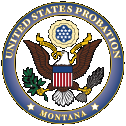- Montana persons under supervision are being targeted by a phone call from local county sheriff’s departments threatening fines for not being registered as a sex offender. When a client returns the call, the recorded auto attendant is almost identical to the legitimate sheriff’s department recorded greeting. During these calls, the scammers know actual law enforcement and judicial official names and will relay facts using correct terminology. This scam will eventually go a step further whereby the scammer offers to meet with the client personally for payment of a bond or fine instead of coming into the law enforcement office. This spear phishing scam is sophisticated. When receiving a call of this nature, think about:
- Who initiated the first contact?
- Is the law enforcement asking for account information or money?
- Is the law enforcement official offering to do you a favor by making it easier to pay a bond or fine, whether by over the phone payment or arranging to meet you in person for payment?
If unsure about a call from law enforcement, hang up and independently seek the published contact number for the agency to verify the call. You can also reach out to your probation officer to discuss the validity of the call.
- Montana persons under supervision are being targed by callers typically pretending to represent the U.S. Probation Office, U.S. Parole Commission or the Federal Bureau of Prisons. These calls promise various services and benefits, including assignment to lower security prisons, release from BOP custody, termination of supervised release and approved relocation requests. The goal appears to be to obtain money and personal information. U.S. Probation Offices and other federal agencies do not ask for money in exchange for services. Suspected scam calls may be reported to the Federal Trade Commission at https://reportfraud.ftc.gov/#/ or by calling (877) 382-4357.
- People are being targeted by phone call, email and messaging scams threatening them with prosecution for failing to comply with jury service. In the communications, recipients are pressured to provide confidential data, potentially leading to identity theft and fraud. The scammers threaten recipients with fines and jail time if they do not comply. These communications are fraudulent and are not connected with the U.S. courts. Please note that the U.S. District Court does not summon jurors via email. DO NOT open any links in an email that purports to summon you for federal jury service. You should delete the message immediately. A genuine summons for federal jury service will arrive via U.S. mail bearing the court seal and will provide the court's email and phone contact information.
- The U.S. Marshals Service is also warning the public of a nationwide telephone scam involving individuals claiming to be U.S. marshals, court officers or law enforcement officials seeking to collect a fine in lieu of arrest for failing to report for jury duty. The U.S. Marshals Service does not call anyone to arrange payment of fines over the phone for failure to appear for jury duty or any other infraction. In order to appear more credible, the scammers may even provide information like badge numbers and the names of actual federal judges and courthouse addresses. Victims have been told they can avoid arrest by paying a fine using a reloadable credit card, and were urged to call a number and provide their own credit card number to initiate the process. The Marshals Service urges the public not to divulge personal or financial information to unknown callers, even if they sound legitimate.
If you are called by someone who says there is a warrant for your arrest related to missed federal jury duty, do not make any payments to them. Neither the U.S. Marshals Service, nor the U.S. District Court, will ever call to request payment of fines over the phone for failure to appear for jury duty. Persons receiving any such telephone calls or emails should not provide the requested information.
More information about this type of fraudulent activity can be found on the U.S. Courts web page and U.S. Courts Juror Scam Alert.
